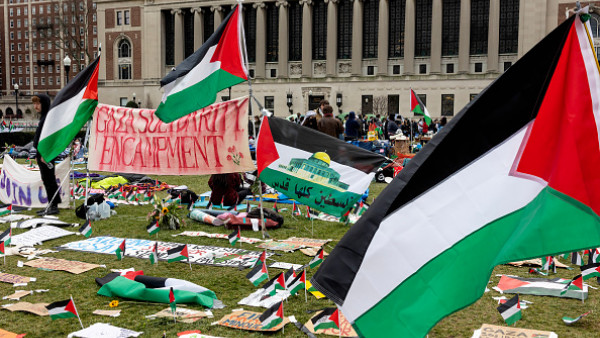Students at Columbia University in New York held demonstrations for weeks which sparked a worldwide student movement in support of Palestinian rights [GETTY]
A group of top US businessmen from across the retail, tech and finance industries were working to encourage New York City’s mayor to use police against student pro-Palestinian protesters, according to a report.
This included the Columbia University encampment, which set off a wave of mass university protests across the world.
Leaked communications from a WhatsApp group made up of businessmen and financiers, including the former CEO of Starbucks and the founder of Dell Computers, as well as hedge fund and entertainment tycoons, reveal attempts to stifle the Gaza protests, including by paying for private investigators.
A report from US outlet The Washington Post published on Thursday reveals how several billionaires have been seeking to shape public perception in America over Israel’s war on Gaza after creating a WhatsApp group titled “Israel Current Events” shortly after 7 October.
The well-connected individuals, which include hedge fund manager Bill Ackman and former Starbucks CEO Howard Schultz, had access to top levels of the Israeli government, the US corporate world and its prestigious universities.
Several of the group’s members appear on Forbes magazine’s annual list of billionaires, the report noted.
Members of the group also suggested donating to New York City Mayor Eric Adams re-election bid, interpreted as a move to “get him on side” regarding the pro-Palestine student college encampments.
Other individuals in the group, which was formed to “change the narrative” in favour of Israel according to the report, include hedge fund manager Daniel Loeb, billionaire Len Blavatnik, real estate investor Joseph Sitt and Joshua Kushner, brother of Jared Kushner, the son-in-law of former president Donald Trump and government advisor on Middle East issues.
Adams came under scrutiny during the student demonstrations, which saw students at the elite Columbia University and other colleges in the city hold mass encampments calling for the end of the Gaza war and for universities to cut education and business ties with Israel.
In a highly controversial move, Columbia’s Egyptian-American president Minouche Shafik, with support from Adams, called in New York Police Department officers in riot gear to clear the encampment on 18 April, which resulted in more than 100 students being detained and handcuffed with zip-ties.
The decision was both criticised and lauded across the political spectrum. It also galvanised students at colleges across the nation who began orchestrating sit-ins and encampments in support of Palestinians and calling for universities to divest. Nearly 3,000 students have since been arrested during the demonstrations.
The movement became a major flashpoint in US politics and has dominated headlines for weeks.
The Washington Post article reports how Leob, Blavatnik and Sitt held a Zoom call with Adams about a week after the mayor sent police to Columbia’s campus.
The message log from the chat group shows how discussions with Adams revolved around making political donations to his 2025 mayoral re-election campaign and how the group could push Columbia’s administration to allow police forces to enter the campus.
One member reportedly donated $2,100 to Adams following the discussions.
Additionally, the log chat of the group shows how connected the individuals are to the Israeli establishment. Former Starbucks CEO Schultz shared how he attended a Zoom briefing with ex-Israeli prime minister Naftali Bennett.
Some members of the group suggested paying for private investigators to support the New York Police Department working on the student protests. According to the chat log, Adams accepted the offer, although this was denied to the newspaper by New York City authorities.
The Washington Post spoke to various sources who had access to the chat and spoke to individuals “close to” the members of the group.
“They shared the information on the condition of anonymity because the chat’s contents were meant to stay private.
“Members of the group verified the chat’s existence and their comments,” the report said.


